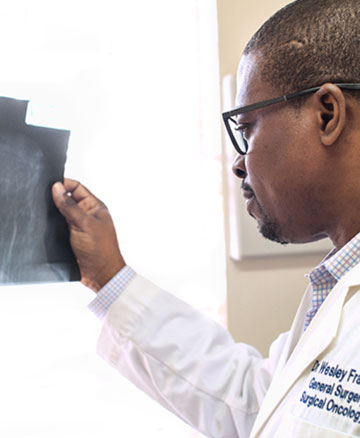Oncology Services Available
Breast Disease/Cancer
Sentinel node biopsy
Colon and Rectal Disorders/Cancer
Endocrine Thyroid, parathyroid and adrenal gland
Liver, Gallbladder, Pancreas Disor/Proc
Bile duct malignancies
Bile duct surgery
Gallbladder cancer
Hepatobiliary surgery
Laparoscopic cholecystectomy
Liver surgery
Pancreatic cancer
Pancreatic cysts
Minimally Invasive Procedures
Laparoscopic surgery
Surgical Oncology (Cancer/Tumors)
Adrenal tumors
Basal cell cancer
Breast cancer Colon/rectal cancer
Endocrine cancer
Gastrointestinal cancer/tumors
Melanoma
Pancreatic cancer/tumors
Skin cancer
Stomach cancer/tumors
Thyroid cancer/nodules

How to prepare for Surgery
- Please shower at home the evening before surgery or in the morning.
- Please do not shave the surgical site! It will be done for you if necessary. Shaving yourself increases the risk of infection.
- For morning surgery, Do Not Eat or Drink anything after midnight the night before surgery unless otherwise instructed. This includes coffee, tea, water, and juice! Medication with a small sip of water is OK. For afternoon surgery, a small breakfast BEFORE 7AM is OK, and nothing after that. Your surgery may be cancelled if you do not follow these instructions.
- Do Not Drink Alcoholic beverages 24 hours prior to your surgery.
- Do Not Smoke for 4 weeks before surgery or your risk of serious complications increases.
- Ask us if you are permitted to take your routine medications (such as those for heart, blood pressure, or insulin etc.) before arriving for surgery.
- Stop aspirin, warfarin, or any other blood thinner 5-7 days prior to surgery.
- Do Not bring valuables such as money, jewelry etc. Do not wear make-up.
- Bring toiletries and loose fitting, comfortable clothing to wear upon discharge.
- You will be required to remove contact lenses, jewelry, dentures, and wigs.
- Arrange for a responsible adult to drive you home after discharge.
- Notify us if there is a change in your condition prior to surgery (such as a cold, cough, fever or infection). If severe, your surgery may need to be postponed for your safety.
- Stop all herbal medications 4 weeks before surgery unless discussed beforehand. Especially Ginseng, Garlic, and Gingko, or St. John’s Wort, which increase the risk of bleeding.
THE DAY OF YOUR SURGERY
- On the day of your surgery, report to hospital reception.
- If you have not already done so, you will meet your anesthetist.
- After the operation, you will spend some time in the recovery room before going to the ward.
- After discharge, and as long as you are taking prescription pain medicine, you are not permitted to:
- Drive a Car nor operate power equipment
- Drink Alcoholic Beverages
- Sign important papers
- Instructions regarding safe resumption of the above activities will be provided by your surgeon.
Frequently Asked Questions
1. How can my family doctor help me to obtain specialist medical care?
Before seeing any medical specialist, you should talk to your family doctor, or general practitioner (GP), who can discuss your condition with you and advise on whether specialist care is appropriate. He or she can help you choose the specialist best suited to your needs. Your GP can help the specialist to care for you by providing relevant information about your health. If you wish, you can request that your GP refer you to your preferred specialist. You are also entitled to seek a second opinion if you wish.
2. What should I expect during my first visit?
Before seeing any medical specialist, you should talk to your family doctor, or general practitioner (GP), who can discuss your condition with you and advise on whether specialist care is appropriate. He or she can help you choose the specialist best suited to your needs. Your GP can help the specialist to care for you by providing relevant information about your health. If you wish, you can request that your GP refer you to your preferred specialist. You are also entitled to seek a second opinion if you wish.
If an operation is needed, the doctor will explain the specific procedure, help you understand what it involves, and explain the risks and benefits. Please feel free to ask as many questions as you like.

